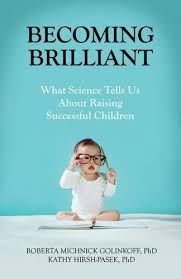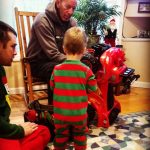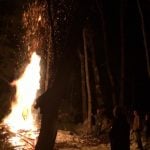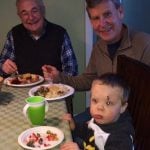 I just finished reading Becoming Brilliant by Roberta Michnick Golinkoff, PhD and Kathy Hirsh-Pasek, PhD. I think it is an important book for parents and educators to read. Here are some of the main points that stood out to me as I summarize my notes. I think it would a great book to read in teacher/parent book club. We might use it as a source to re-vision how we’d like about school to grow. If you’re interested let me know!
I just finished reading Becoming Brilliant by Roberta Michnick Golinkoff, PhD and Kathy Hirsh-Pasek, PhD. I think it is an important book for parents and educators to read. Here are some of the main points that stood out to me as I summarize my notes. I think it would a great book to read in teacher/parent book club. We might use it as a source to re-vision how we’d like about school to grow. If you’re interested let me know!
Collaboration, communication, content, critical thinking, creativity and confidence have been identified through scientific research as key skills all children need to meet their future with success. “If scientist do not share what we know, the void will be filled by those with little experience or with values that are more in line with the market place than with the betterment of children.” p 8.
![]()
Success has been redefined in our new Age of Information – how will we broaden our vision and expand our educational environments so these key skills are more likely to flourish?
Do a greenfield experiment with my classroom – what would I build if there were no constraints?
Encourage real thinking with high doses of creativity and innovation. Build a classroom environment that fosters playful exploration, collaboration and problem solving.
It is important to understand the necessity of building “soft skills” in schools. “Children are far more than the grades they earn.” p 55.
The more self-control and social competence expected, the more likely it will show. When practiced through collaborative projects an identified through reflective discussions these skills develop and grow.
Effective communication fuels collaboration. Effective communication is built on careful listening with attention to empathy.
Information is everywhere and easy to find. Learning is not about content or knowing a bit about lots of things. Learning is gaining a deepening understanding of the process of acquiring, interpreting and applying information so that the learner is transformed.
Critical thinking is key to understanding and making informed decisions that will lead to new opportunities.
Make space for play, for reflections, for what-ifs, and what’s next and for dreaming of possibilities.
You have to be willing to try. You have to be willing to fail. You have to examine the process and move forward – engage, persist, envision, express, reflect – experiment, hypothesize, questions revise – cycle through again.
Creators of effective learning environments embrace the responsibility for nurturing growth in all the essential skills (the 6C’s) required for success. They attend to the growth of the whole child.
 My vacation was full of small ordinary moments. There was nothing anyone could call sensational but each one made me appreciate each part of my family. I had time at home with mom and dad and my sister Beth. We remembered the “the old days.” We laughed about Christmas night at Aunt Muriel’s and crazy days of runner sleds on the crusty snow in Grandpa’s back fields. My cousin dropped off poinsettias from the family greenhouse. There were five different colors – one for each of us. We brought the red-flecked one home.
My vacation was full of small ordinary moments. There was nothing anyone could call sensational but each one made me appreciate each part of my family. I had time at home with mom and dad and my sister Beth. We remembered the “the old days.” We laughed about Christmas night at Aunt Muriel’s and crazy days of runner sleds on the crusty snow in Grandpa’s back fields. My cousin dropped off poinsettias from the family greenhouse. There were five different colors – one for each of us. We brought the red-flecked one home.
 The next day we got to see James. He was in awe of his Christmas morning abundance. I think he’s still getting used to everything that fills up his play spaces and room.
The next day we got to see James. He was in awe of his Christmas morning abundance. I think he’s still getting used to everything that fills up his play spaces and room.
 A few days later as many of the Eaves family as could make it, came over for feasting, a gift swap and an enormous bonfire.
A few days later as many of the Eaves family as could make it, came over for feasting, a gift swap and an enormous bonfire.